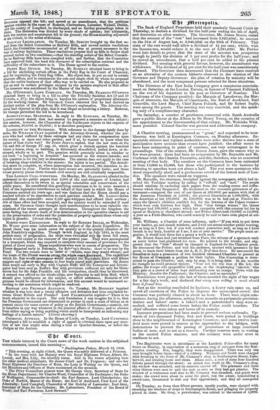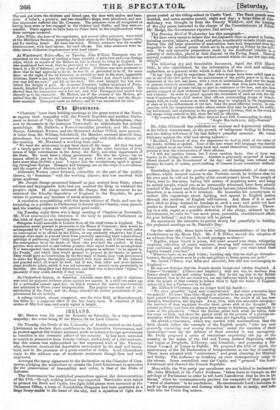gibe jfIttropolts.
The Bank of England Proprietors held their quarterly General Court on Thursday, to declare a dividend for the half-year ending the 5th of April, and determine on other matters. The Governor, Mr. James Morris, stated that the amount of the " rest" had increased from 3,925,6341., its amount on the 31st of August last, to 8,946,5241. on the 29th of February. This state of the rest would well allow a dividend of 4i- per cent; which, with the Income-tax, would reduce it to the sum of 3,291,639/. Mr. Fielder went into details to prove that the state of the account was prosperous enough to justify the division of 5 per cent profits for the half-year; and he moved an amendment, that a half per cent be added to the present dividend. Not meeting with general favour, however, the amendment was withdrawn. The dividend of 41 per cent for the half-year was unanimously affirmed. The Governor then announced that the Directors have resolved on an alteration of the custom hitherto observed in the election of the Governor and Deputy-Governor: the plan of rotation by seniority will be abandoned, and the most competent persons selected fer those situations. The Bank of England Proprietors held their quarterly General Court on Thursday, to declare a dividend for the half-year ending the 5th of April, and determine on other matters. The Governor, Mr. James Morris, stated that the amount of the " rest" had increased from 3,925,6341., its amount on the 31st of August last, to 8,946,5241. on the 29th of February. This state of the rest would well allow a dividend of 4i- per cent; which, with the Income-tax, would reduce it to the sum of 3,291,639/. Mr. Fielder went into details to prove that the state of the account was prosperous enough to justify the division of 5 per cent profits for the half-year; and he moved an amendment, that a half per cent be added to the present dividend. Not meeting with general favour, however, the amendment was withdrawn. The dividend of 41 per cent for the half-year was unanimously affirmed. The Governor then announced that the Directors have resolved on an alteration of the custom hitherto observed in the election of the Governor and Deputy-Governor: the plan of rotation by seniority will be abandoned, and the most competent persons selected fer those situations.
The Directors of the East India Company gave a sumptuous entertain- ment on Saturday, at the London Tavern, in honour of Viscount Falkland, on the eve of his departure to his post as Governor of Bombay. The. Chairman of the Company presided: the Marquis of Lansdowne, the Mar- quis of Abereorn, the Marquis of Clanricarde, the Earl of Auckland, Earl Granville, the Lord Mayor, Chief Baron Pollock, and Sir Robert Inglis, were among the guests. The meeting was very convivial, and the speak- ing only cf a complimentary character.
On Saturday, a number of gentlemen connected with. South Australia gave a public dinner at the Albion to Sir Henry Young, on the occasion of his appointment to the Governorship of that colony. Mr. Wolriche Whit more presided. Colonel Gawler was present and, addressed the company.
A Chartist meeting, preannounced as " great," and expected to be trou- blesome, was held at Kennington Common, on Monday afternoon. Re- spectable citizens and vigilant authorities were alike thrown into a state of anticipation more anxious than events have justified: the affair seems to have been unimposing in point of numbers, not very extravagant in its proceedings. One of the orators, Mr. Ernest Jones, gave the reason why so few were present: there had been no celiperation by Mr. Reynolds and Mr. Cochrane with the Chartist Executive, and this, therefore, was no concerted meeting of that body. The numbers on the Common have been estimated at from 13,000 to 15,000, but those who participated in the business by listening to speeches were not above a half. The rest were spectators who stood respectfully aloof; and a predaceous crowd of the lowest mob of Lon- don. The speakers were raised on waggons. Mr. Reynolds, the chairman, inveighed against the newspapers, which had in- sulted the Trafalgar meeting by calling it "riffraff," and "mob." The people should retaliate by excluding such papers from the reading-rooms and coffee- houses which they frequented. He declaimed on the economic grievances of go- vernment—compared the cost of our Queen at 400,0001. per annum with that of the American President at 5,0001.; our general Executive at 1,000,0001., with the American at but 100,0001. So 150,0001. was to be laid out at Pimlico be- cause the Queen's children couldn't live for the lowness of the Palace rooms— which were only fourteen feet high. Then "that foreign woman" the Queen Dowager had 100,0001. a year; which her sympathy with this country led her to spend at Madeira or elsewhere abroad; and Prince Albert took 12,0001. or 14,0001. a year as a Field-Marshal, who could scarcely be said to have even played at sol- diers.
Mr. Williams, a Chartist of some influence, said—" If you wish to put down your leaders, go and smash windows, and I will not attend another public meeting, not as long as I live; but if you will conduct yourselves well as long as I have breath in my body, humble as I am, I am at your service." The people must or- ganize: it would cost them but a penny a week each. Mr. Ernest Jones had just returned from Paris, the witness of a spectacle such as never before had gladdened his eyes. He pointed to the tricolor, and sug- gested that the " blue " should be changed in England for the Chartist green. He denounced the Police; and told his audience, taunted with ignorance by the great, to learn their letters from the A B, C, D of that force. He announced the intention to haves procession of two hundred thousand Chartists to present at the House of. Cennuona a petition for their rights. The Conventicia is deter- mined to pass the Charter; and, step by step, It is being done. In six months .he thought he could promise victory. "Fear not the vile then of the law, the police, the troops who sympathize with you, or the shopkeeping ',medals' who tarp pale at a crowd of three boys deliberating over an orange. Down with the Ministry; dissolve the Parliament; the Charter; and no surrender!"
Resolutions were passed: the last of them asserted the right of fair wages for a fair day's work, and declared that every man willing to work should have it found him.
Just as the meeting concluded its business, a heavy rain came on, and saved all exertions of the Police to disperse the unoccupied crowd: the CommOn was perfectly cleared in about an hour. There were slight com- motions during the afternoon, arising from assaults on peripatetic provision- dealers and bakers' carts: a baker's and a pawnbroker's shop were as- saulted, and suffered some losses before the Police could interfere. The chief offenders were taken and borne off in custody.
Immense preparations had been made to prevent serious outbreaks. Up- wards of two thousand Police, foot and horse, were posted in buildings close to' he neighbourood of Kennington Common; and some twelve hun- dred more were posted in masses at the approaches to the bridges, with instructions to prevent the passing of processions or large combined bodies of men, and to act as a reserve. Further reserves were in waiting at the central Police stations, and the military were under arms in readiness to act.
Two Magistrates were in attendance at the Lambeth Police-office for many hours on Monday, in expectation of a numerous crop of outrages from the Ken- nington meeting. But, happily, they were disappointed. There was only one case brought before them—that of a robbery. Williams and Smith were charged with breaking in the front of Mr. Creassey 'a shop in Southampton Street, Cam- berwell, and stealing boots and shoes. About noun, a mob of some four hundred fellows passed through the street: an attack was made on Mr. Creassey's shop, the window was smashed, and its contents carried off. The prisoners and three other thieves were seen to quit the mob so soon as they hadgot plunder. The window of a tradesman next door to Mr. Creassey was smashed, and goods were stolen: the crowd were about to enter the place, but the owner, brandishing a sword-cane, threatened to stab any that approached; and they all scampered away. On Tuesday, no fewer than fifteen persons, mostly youths, were charged with smashing the windows of shops in Southampton Street, and pillaging the property placed in them. Mr. Gray, a pawnbroker, was robbed to the extent of 1,0001.
The mob got down the shutters and forced open the door with stakes and ham- mers. A tailor's, a grocer's, and two chandler's shops, were plundered, and ano- ther shoemaker suffered like Mr. Creassey. The prisoners were all recognized as having been more or less engaged in the violence and thefts; and they were re- manded. There appears to have been no Police force in the neighbourhood when these outrages occurred. John White, the hero of the epaulettes, and several other prisoners, were tried at the Middlesex Sessions, yesterday,for their share in the Trafalgar Square riots, and for stealing bread. All were convicted. White's sentence was six months' imprisonment, with hard labour, for each offense. The other sentences were va- rious terms of shorter imprisonment with bard labour.
At Wandsworth Police-office, on Tuesday, John William Thompson was re- examined on the charge of stealing a large quantity of gold-dust and some foreign coins, which as master of the Medora he bad in charge to bring to England. It was mentioned last week, that he pretended to have thrown the gold-dust over- board, in a fit of delirium, on the coast of Africa. Evidence was now produced to show that he had appeared to do so: he was ill, or pretended to be ill, for some time; on the night Of the 3d February, he rushed on deck in his shirt, apparently delirious, threw a box into the sea, exclaiming, " There! you shan't have that— you may kill me now 1 " sod fell on the deck. The crew thought the box con- tained the freight of gold. Mr. Emanuel Emanuel, bullion-merchant of Ports- mouth, detailed the purchase of gold-dust and foreign coin from the accused. He showed that the transaction was a fair one, and that Thompson had misled him cleverly as to his character. Mr. Hutton, one of the owners of the hiedora, ad- mitted that Mr. Emanuel had behaved in a straightforward way; and the Magis- trate assented. Thompson made no defence, and he was committed for trial.



























 Previous page
Previous page